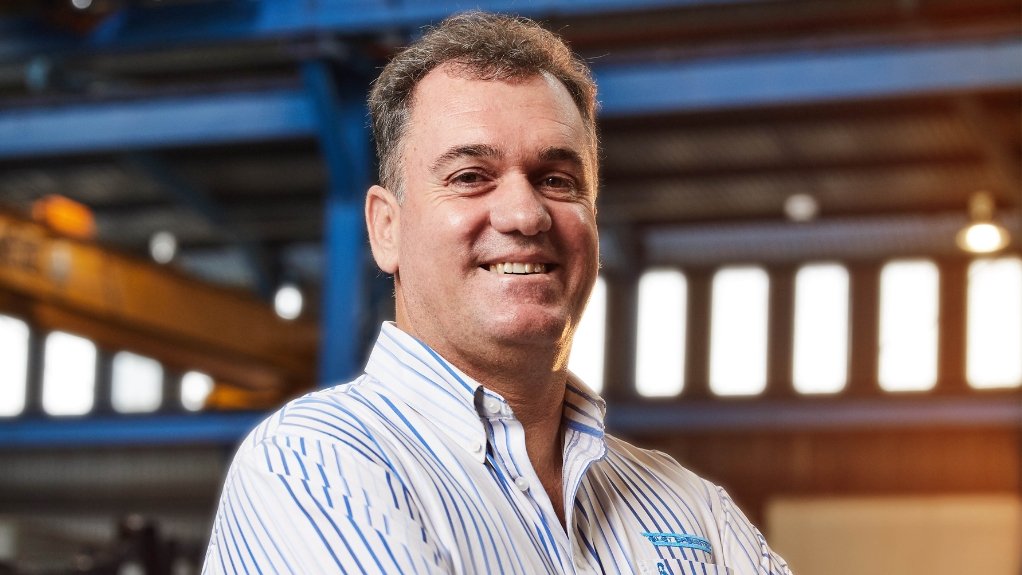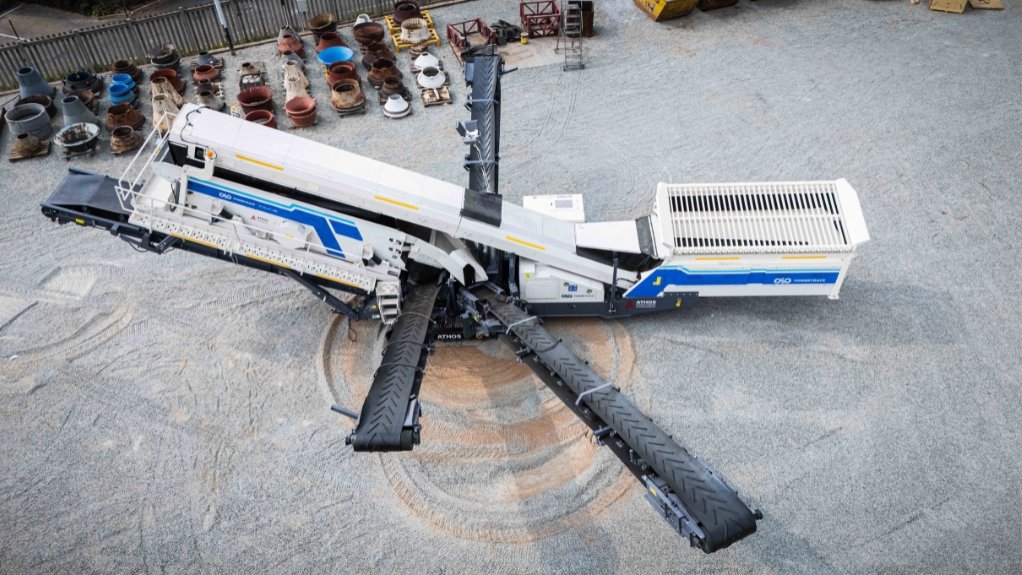Benefits of new electric range expected to advance uptake




FRANCOIS MARAIS Where the real benefit lies for local customers, is the ability to power Powertrack units using grid-based electricity
JORGE ABELHO As the Powertrack range is fully electric, there are fewer moving parts, making it a much simpler, more compact design
ELECTRIC DESIGN Powertrack’s rugged design delivers reliable performance in challenging quarrying and mining conditions
The e-Power Powertrack range of mobile crushers and screens from equipment solutions provider Athos Crushing & Screening is poised to meet the growing demand for greener mining and quarrying solutions in Southern Africa. However, while the mining industry is increasingly open to more sustainable solutions to achieve environmental, social and governance (ESG) targets, it is also historically resistant to change.
The company has already sold two Powertrack units, built by Metso-owned company SRHeavy, to produce aggregates for a road construction project in a remote location outside of South Africa, following the launch of the range in July.
But, Athos Crushing & Screening sales and marketing director Francois Marais admits that “change is always difficult, especially in the mining industry where things haven't really changed for the last 80 years”.
Therefore, Athos Crushing & Screening expects mining and quarrying operations to be reluctant to adopt this new technology initially, he explains.
The sister company of Pilot Crushtec International, Athos Crushing & Screening was established about five years ago with the mandate to provide entry-level and midtier mobile and static crushing and screening solutions.
Taking a pragmatic approach, while also leveraging the trust and good reputation built by Pilot Crushtec over the past 35 years, Athos Crushing & Screening is confident about overcoming the initial challenges associated with introducing the Powertrack range into the local market.
“As the Powertrack range is fully electric, there are fewer moving parts, making it a much simpler, more compact design. You don’t have to worry about the subsystems associated with diesel-driven designs, or having to deal with another original-equipment manufacturer (OEM), such as an engine manufacturer, for example,” elaborates Athos Crushing & Screening technical director Jorge Abelho.
The Powertrack range also offers greater operational efficiency compared with diesel engines, which have a maximum efficiency of 35% to 40%. Conversely, electric drivetrains offer a 90% efficiency rate, delivering much more value for money, he adds.
Marais agrees that the differentiator will be the simplicity of the maintenance, and a significant saving on operational costs owing to the use of grid-based power instead of diesel, as well as fewer consumable components.
“In terms of production volumes, I don’t necessarily believe that it’ll be vastly different from diesel-driven alternatives. But certainly, there are lots of efficiencies that incentivise the procurement of a fully electric machine.”
Depending on the operating environment, if the site has high dust fallout, for example, a diesel equivalent may require more frequent filter changes in addition to being serviced every 250 hours. However, Abelho highlights that 250-hour checks are still recommended for electric mobile crushers and screens in addition to daily checks. These checks, he emphasises are, however, much more simplified compared with having to maintain and operate diesel-driven equipment, which also has a higher tendency to break down.
“If you’re running electric equipment, you don’t have to worry about checking fluid levels or transporting 500ℓ of diesel a day down to the pit. You don’t have to accommodate bulk storage of diesel, worry about water contamination or diesel theft. Logistically, using electric equipment can result in a noticeable saving,” states Abelho.
Further, where grid-based power is not available, one generator set can be used to power three separate electric machines, negating the need to maintain and fuel three diesel engines.
Electric equipment is also much quieter, emits less heat during operation and can offer a longer duty cycle.
“Many customers aren’t aware that diesel-powered machines need to run consistently at an average load of between 60% and 90% to prevent the life of the engine components drastically diminishing. Going electric removes a lot of stress in this regard.”
Also, while extreme temperatures and altitude can affect the efficiency of electric equipment, it does not impact nearly as much as extreme operating conditions do on diesel engines. Electric motors also do not need to be oversized to accommodate overload as with diesel engines.
However, the reason why the uptake of electrically driven equipment is growing internationally, and where the real benefit lies for local customers, is the ability to power Powertrack units using grid-based electricity, advances Marais.
“We know that power, from an infrastructure perspective, is a challenge in sub-Saharan Africa, but if you’re able to power this equipment from a grid supply, you can look at savings of between 40% to 50% on your diesel consumption versus electricity costs.”
Article Enquiry
Email Article
Save Article
Feedback
To advertise email advertising@creamermedia.co.za or click here
Announcements
What's On
Subscribe to improve your user experience...
Option 1 (equivalent of R125 a month):
Receive a weekly copy of Creamer Media's Engineering News & Mining Weekly magazine
(print copy for those in South Africa and e-magazine for those outside of South Africa)
Receive daily email newsletters
Access to full search results
Access archive of magazine back copies
Access to Projects in Progress
Access to ONE Research Report of your choice in PDF format
Option 2 (equivalent of R375 a month):
All benefits from Option 1
PLUS
Access to Creamer Media's Research Channel Africa for ALL Research Reports, in PDF format, on various industrial and mining sectors
including Electricity; Water; Energy Transition; Hydrogen; Roads, Rail and Ports; Coal; Gold; Platinum; Battery Metals; etc.
Already a subscriber?
Forgotten your password?
Receive weekly copy of Creamer Media's Engineering News & Mining Weekly magazine (print copy for those in South Africa and e-magazine for those outside of South Africa)
➕
Recieve daily email newsletters
➕
Access to full search results
➕
Access archive of magazine back copies
➕
Access to Projects in Progress
➕
Access to ONE Research Report of your choice in PDF format
RESEARCH CHANNEL AFRICA
R4500 (equivalent of R375 a month)
SUBSCRIBEAll benefits from Option 1
➕
Access to Creamer Media's Research Channel Africa for ALL Research Reports on various industrial and mining sectors, in PDF format, including on:
Electricity
➕
Water
➕
Energy Transition
➕
Hydrogen
➕
Roads, Rail and Ports
➕
Coal
➕
Gold
➕
Platinum
➕
Battery Metals
➕
etc.
Receive all benefits from Option 1 or Option 2 delivered to numerous people at your company
➕
Multiple User names and Passwords for simultaneous log-ins
➕
Intranet integration access to all in your organisation



















